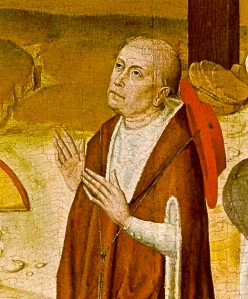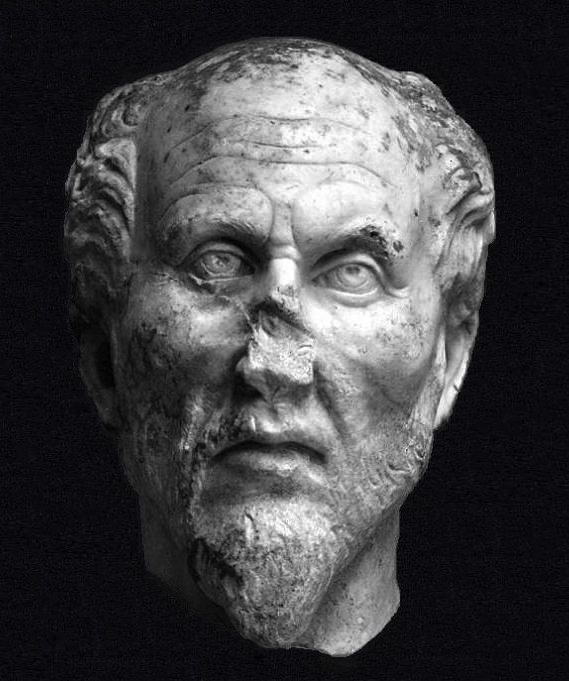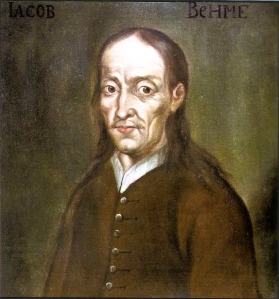
Nicholas of Cusa (1401-1464) From a painting by Meister des Marienlebens (Master of the Life of the Virgin), located in the hospital at Kues (Germany)
Edited transcript of my presentation at the Department of Philosophy ‘mini-conference’, the University of Sydney 12.09.14. Part three
I believe that Hegel could never even mention Cusanus for two reasons – the second following from the first:
- he was so indebted to him
- if that debt were ever exposed, he could never escape the charge, made correctly of him during his lifetime, that his philosophy is mystical.
This opens out into the far broader question regarding mysticism being treated as the pornography of academic philosophy (assiduously studied by many and its principles absorbed, but that influence claimed to be other, dissembled about or denied).
In denying through his utter silence the significance of Cusanus and the foresight of his genius, Hegel was emblematic not only of the German intellectuals of his time (with regard to Spinoza then Swedenborg and Oetinger and later, Nietzsche with regard to ‘Saint Max’ Stirner) but of Western culture as a whole – suppressing key elements of our history, of what has made us, so that we may perceive ourselves, as Hegel did, the bearers and masters of ‘Reason.’
We of the West believe it has been our ‘reason’ – primarily understood as linguistic, conceptual and particularly propositional – that has enabled us to achieve so much and attain global domination. Mysticism, the myth goes, was only a stage that was shed long ago.
What if ‘reason’ were understood to function not only linguistically, conceptually and propositionally (the reason of patriarchy) but in a manner that has been relegated to and powerfully utilised in the mystical, in ‘the feminine’?
As a materialist I state that mysticism has contributed and contributes profoundly to all aspects of our culture as William Franke’s two volume anthology On What Cannot be Said – Apophatic Discourses in Philosophy, Religion, Literature, and the Arts (Classic Formulations and Modern and Contemporary Transformations) well exemplifies – it inspired Copernicus to the greatest scientific hypothesis, it inspired Kepler to his theory of elliptical orbits in a wonderful yet imperfect world, it informed the pivotal moment of modernist art (Cubism) through the philosophy of Bergson – and I believe its not being taught (distinct from advocated) academically is the most gross failure of intellectual and social responsibility.
Marx correctly took Hegel’s philosophy and stood it on its feet but failed, as did Hegel, to overcome the Neoplatonic teleology – which for Hegel concluded in the Prussian state and for Marx, in ‘communism’. There will never be an end to the engine of contradiction, in nature or in that aspect of it called ‘society’.
I would like to merely touch on one point with regard to Hegel as I believe he was, a prose poet. Donald Phillip Verene wrote of our having lost track of the dimensions of philosophical language:
‘we have so little experience in taking metaphorical speech seriously as a carrier of philosophical meaning that we read right past it. …we have become so accustomed to the monotone hum of the abstract concept and the category, the fluorescent buzz of the argument, that we have lost track of the dimensions of philosophical language. We have forgotten its secrets and cannot recollect its manner of eating bread and drinking wine.’1
I will finish with a quotation from Magee: ‘an appreciation of the role of mystical ideas in the thought of Hegel and other modern thinkers opens new vistas, new paradigms for the history of modern philosophy and for the philosophy of history.’2
Notes
1. Donald Phillip Verene, Hegel’s Recollection: A Study of Images in The Phenomenology of Spirit, State University of New York Press, Albany, New York, 1985, 34-35 ↩
2. Glenn Alexander Magee, ‘Hegel and Mysticism’, pp. 253-280 in Frederick C. Beiser, Ed., The Cambridge Companion to Hegel and Nineteenth-Century Philosophy, Cambridge University Press, Cambridge, 2009, 280 ↩
Image sources: Plotinus/Cusanus/Hegel/Böhme/Rose-Cross





Excellent. I think reconnecting with mysticism can offer us a new metaphysics that enrich our rationalistic world view. I wonder if you have ever engaged with C.G. Jung or perhaps philosophers like Deleuze?
LikeLiked by 1 person
Hello thoughtation, thank you for your response. As a materialist my position regarding mysticism is not to develop a new metaphysics but it is to first of all argue for honesty with regard to the profound and positive impact of mysticism on all aspects of (Western) culture. Secondly it is to argue that mysticism relies on and exemplifies the potential of a form of thought that is very different from the dominant, patriarchal model (linguistic, conceptual and propositional). To continue to deny this, to refuse to explore its potential – particularly in relation to the obvious potential of the dominant model – is to deny and cripple the full potential of the most advanced organisation of matter yet known to us in the universe – the human brain. Phil
LikeLike
I think I am following you… Perhaps you might share my view that this also includes the unconscious?
LikeLiked by 1 person
I am referring to the incredible potential of the brain in its entirety. When a person wakes at 4am with the solution to a long-standing problem (a Eureka! moment) how did they arrive at that solution? Had they been engaging in the intricacies of formal logic? I don’t think so. Had they been thinking linguistically, conceptually and propositionally? Again, I don’t think so (because both methods require consciousness). What I do think is that by employing in their sleep a far more fluid, richer, more deeply sourced and complex process they were able to achieve what they could not by employing only the patriarchal processes (if they are lucky, they might recall the tail-end of those processes just before they woke).
LikeLike
I whole heartedly agree. Moreover I don’t think it’s something that can be easily articulated either. For instance allowing oneself and having a stance of passivity the most wonderful and creative ideas develop, almost out of nothingness.
LikeLiked by 1 person
I agree with you. That difficulty in articulation is something that mystics have given a great deal of thought to – the ‘limits of language’. Hence their utilisation of metaphor, imagery, examples from mathematics and geometry (Cusanus), poetry etc. (in my view Hegel was a great prose poet). Also, science is making great inroads into understanding these processes and how they relate with the linguistic and conceptual etc. Philosophers have a lot of catching up to do – by being honest with regard to mysticism (particularly in Western culture) and by engaging with the latest developments in brain science.
LikeLike
I don’t think there is any doubt that Hegel was “a mystic” in some ways, and he didn’t hide it, other than by writing in Hegelese 🙂 . For somewhere he identifies Mysticism & Reason/Vernunft, saying they are the same thing. In a somewhat similar vein, in a few places he comments on Descartes Cogito, how the existence of the thinking subjects it proves is so preposterous, so unbelievable – but is the most solid thing we know, the backbone of modern philosophy. Similar to EInstein on the most incomprehensible thing in the universe is its comprehensibility. But the connection with Cusa sounds right. People are trying to figger out how “old” mysticism & “modern” reason mesh. Came to this page from links at http://ncatlab.org/nlab/print/Science+of+Logic .
LikeLiked by 1 person
Hello Calgacus,
Hegel advocated a priesthood of philosophers and this concealed (i.e. dishonest) priesthood in academic philosophy has served Hegel (and their patriarchal capitalist ideology) well.
The very concept which academic philosophers pride themselves so much on – ‘reason’ – is their weakest point. ‘Reason’ is to be exemplified in what they teach, not to be understood for what it is.
To deny that Hegel was a mystic requires the most focused determination. He was profoundly indebted to Cusanus and the reason why I have found the undeniable connection between the two, missed by all the Hegel ‘experts’ and time-serving academics is because I do not subscribe to patriarchal capitalist ideology and its supremacist understanding of ‘reason’.
Hegel’s philosophy, until Marx stood it right way up, best reflected the world yet he, like other patriarchs in modern Western philosophy, was profoundly dishonest in denying his philosophical influences (so much for ‘the love of wisdom’).
This is why I refer to mysticism as the pornography of academic philosophers – to be studied and drawn upon in private and lied about in public.
Best regards,
Phil
LikeLike
This is fascinating!
It makes intuitive sense that the rational epistemology of modernity is predicated on broader mystical & gnostic epistemologies that modernity attempts to disavow. This relationship of constitutive, disavowed Otherness is so characteristic of modernity, and sets up the basis for the imperialist delusion of cultural supremacy.
“There will never be an end to the engine of contradiction, in nature or in that aspect of it called ‘society’.”
Homi Bhabha insists on this exact point as one of the fundamental stances of postcolonial theory in its reckoning with the metaphysics of modernity.
LikeLiked by 1 person
Just as India’s 2000 year history of materialism has been all but obliterated from that nation’s philosophy by those who hated it, so the impact of mysticism, and its primary Western form, Neoplatonism, been obliterated and lied about in the West – even as it has been plundered over and again by ‘philosophers’ (lovers of truth) for its vitalism. Reading comments such as yours is a rare experience for me.
LikeLike